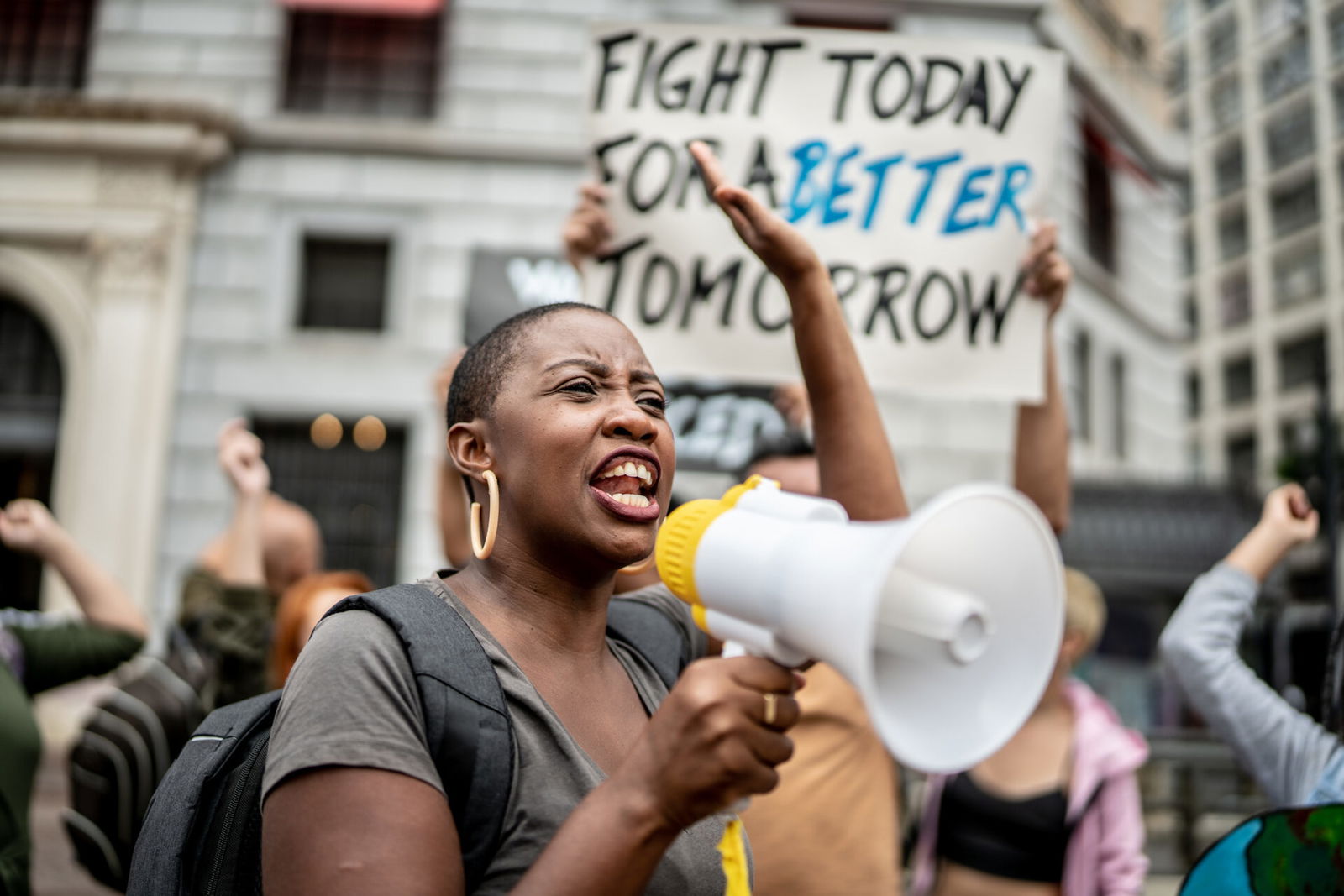Domestic violence is often an unseen crisis that occurs behind closed doors. In the United States, more than 35.6 % of women and roughly 28.5 % of men are affected by DV. Under the Violence Against Women Act (VAWA) the term covers sexual abuse, as well as any coercive behavior used to assert power over an intimate partner. All fifty states have enacted legislation that imposes penalties and funds services for victims of domestic abuse. Black activists who are confronting violence lead with personal experience, exercise cultural responsibility. They call out the domestic violence system, the lack of access that brings about positive outcomes and are redefining policy, advocacy and healing.
Beverly Gooden
Beverly Gooden, a writer and social activist from Cleveland, Ohio, sparked the #WhyIStayed campaign in 2014. The hashtag turned the dialogue on its head, moving the focus from scrutinising victims to probing why abusers resort to violence. Now based in Houston, Texas, Gooden has addressed audiences at a myriad of platforms and college campuses. Gooden launched the movement in the wake of the September 2014 Ray Rice domestic‑violence video. Having endured abuse herself, Gooden’s aim was to amplify survivors’ voices and expose the misunderstandings that often mute them. #WhyIStayed morphed into a conversation giving survivors a moment to be seen and raising awareness about the need to leave abusive relationships.
Sil Lai Abrams
Sil Lai Abrams is a writer, speaker and domestic‑violence‑awareness activist. Abrams put those roles into practice by founding Truth In Reality, a social‑advocacy nonprofit. To push back against the way the media often frames women of color and to help violence in Black communities, she kicked off the Redefining HERstory campus tour. Abrams’ journey in advocacy started in the mid‑2000s with volunteer stints at domestic‑violence shelters. By 2007, Abrams had transitioned to full‑time work in the field. Having survived assault and domestic violence herself, she unpacks the race and gender that determines how Black women are affected by- and portrayed within cycles of abuse. Her advocacy spotlights the ways media portrayals and entrenched cultural stereotypes not only fuel violence but silences and overlooks survivors.
Nupol Kiazolu
Born in 2000 in Brooklyn, New York, Nupol Kiazolu has devoted her work to championing survivors of sexual violence, homelessness and civil‑rights struggles. Raised in a shelter, Kiazolu carries an awareness of the vulnerabilities that affect Black communities, channeling that insight into a form of intersectional activism that blends youthful energy with survivor‑focused support. Kiazolu leads efforts that uplift survivors of intimate‑partner violence, weaving together grassroots organizing with avenues for healing. As a representative of a generation of Black domestic‑violence advocates Kiazolu stresses the need to reach younger survivors and to fuse community activism with restorative care.
Dr. E. Faye Williams
Dr. E. Faye Williams, a civil‑rights attorney and political activist, has spent decades championing women’s rights and confronting violence within the Black community. While serving as president of the National Congress of Black Women, Dr. Williams helped lift women’s voices, thrust the conversation about abuse into the public arena and pushed for legislative measures, including the reauthorizing of the Violence Against Women Act. Williams’ career has been dedicated to supporting women and families across the nation. Drawing on her experience as a survivor of abuse, Williams insists on systemic safeguards for survivors and advocates for sweeping structural change.
Paméla Michelle Tate, Ph.D.
Paméla Michelle Tate, Ph.D. has spent more than 18 years in San Francisco, in the trenches of domestic‑violence prevention, wearing the hats of advocate, educator and speaker. As its director, Dr. Tate now steers Black Women Revolt Against Domestic Violence, a Bay‑Area resource hub devoted to women and families. In the course of training hundreds of advocates, Tate has repeatedly seen how Black women and their loved ones run into roadblocks. Tate works to fortifying community‑based responses foregrounding attuned advocacy and guiding survivors through support networks, with impediments.
Aishah Shahidah Simmons
Aishah Shahidah Simmons, a Black feminist, lesbian, survivor-healer, documentary filmmaker, author and educator, centers advocacy against sexual and domestic violence in Black communities. Simmons’ acclaimed film, NO! The Rape Documentary (2006) and subsequent anthology, Love WITH Accountability: Digging Up the Roots of Child Sexual Abuse, expose domestic and sexual violence in Black communities and promote survivor-driven healing. Based in Philadelphia and active internationally, Simmons’ activism and work spans almost four decades. As a survivor of childhood sexual abuse and adult rape, Simmons uses creative work to bridge cultural, gender, race, and sexuality dimensions of violence and healing, shaping how domestic/sexual violence is discussed in Black communities, accountability, and cultural transformation.
Fallon MK
Fallon MK, a psychotherapist licensed to practice channels the reality of her own escape, from domestic violence into a force that empowers victims and amplifies public consciousness. She works to strip the stigma that clings to survivors’ testimonies, underscoring that abuse is fundamentally an exertion of control, rather than simply a physical assault. Recent articles highlight how her outspoken advocacy now resonates on a scale. Having grown up in a single‑parent household and later found herself caught in relationships she now calls for voices to be raised, for solidarity to be forged and for the cycle of abuse to be shattered.
RELATED CONTENT: 7 Mobile Apps That Offer Domestic Violence Assistance



